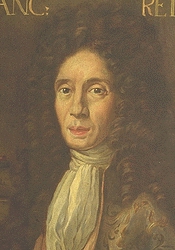Redi, Francesco (1626–1697)
Francesco Redi was an Italian physician and poet whose experiments, in 1668, on the putrefaction of meat showed that maggots were not produced by the meat but came from small eggs laid by flies.
 |
Redi's interest was aroused by a book by William Harvey who proposed that insects, worms and frogs came from seeds or eggs too small to be seen. In 1668, Redi's classic experimental method was one of the first examples of a biological experiment with proper controls. He repeated the same experiments in different ways, modifying only one parameter at a time, and carrying out suitable tests. Redi prepared eight flasks with different kinds of meat; four were left open and four sealed. The meat rotted in all the flasks, but maggots appeared only in the open flasks which flies could freely enter. (To exclude the possibility that maggot's life cycle was affected in sealed jars, he tested further with two other series of jars, allowing air, but no flies, to enter test jars covered with a fine filter.)
Redi's work was followed by that of Spallanzani (1765), Pasteur (1862), and Tyndall, which finally dispelled the old notion of spontaneous generation.


